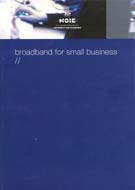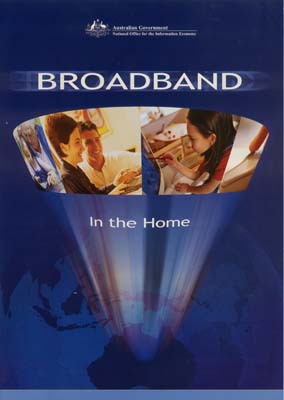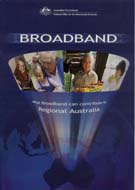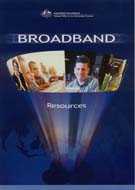
Part of the Broadband Resource Kit, this document aims to help small business owners understand the concept of broadband as well as its benefits. It was written in plain English, to be understood by the lay person.
The document was written by NetSavvy principal Annette Spooner, in cooperation with the National Office for the Information Economy (NOIE), now DCITA.

Part of the Broadband Resource Kit, this document describes the benefits of having broadband at home and explains some of the technical aspects of the technology in layman's terms. It also discusses costs in general terms.
The document was written by NetSavvy principal Annette Spooner, in cooperation with the National Office for the Information Economy (NOIE), now DCITA.

Part of the Broadband Resource Kit, this document explains how broadband can benefit those living in regional Australia. It targets different sectors of the community including primary industry, tourism, education and health.
The document was written by NetSavvy principal Annette Spooner, in cooperation with the National Office for the Information Economy (NOIE), now DCITA.

Part of the Broadband Resource Kit, this documentgives readers a comprehensive list of sources of information about broadband and related topics such as the Internet and e-commerce.
The document was written by NetSavvy principal Annette Spooner, in cooperation with the National Office for the Information Economy (NOIE), now DCITA.
This document is designed to be a standard contract for use in the renewable energy industry. Much as builders have a standard contract, installers of stand alone power systems will be able to use this contract in signing agreements with their customers. It was essential that the document was easy to understand, was fair to both parties and dealt with the most common causes of dispute in the industry. The document has not yet been published.
The technical aspects of the document were written by NetSavvy principal Annette Spooner, in cooperation with the University of NSW School of Electrical Engineering and Telecommunications and the Business Council for Sustainable Energy (BCSE). Some assistance was also obtained from a legal professional.